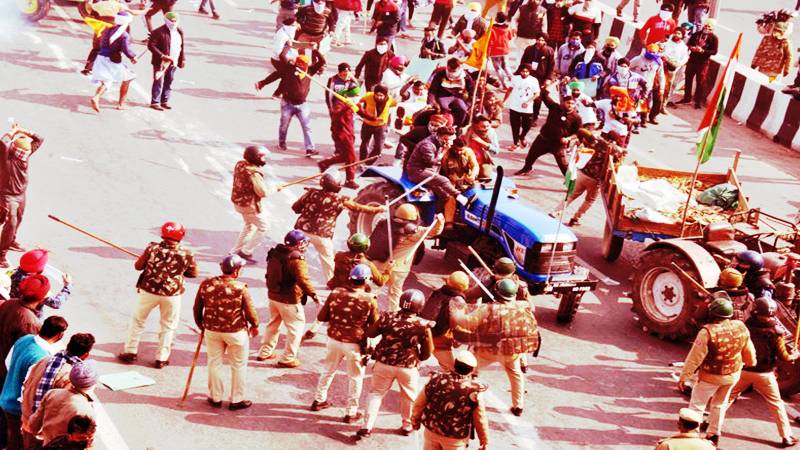
After killing more than 750 farmers for staging protests against their financial murder in 2021, Indian security forces resorted to violence again and fired tear gas and rubber bullets at protesting farmers for a third day on Thursday to halt tens of thousands from marching to the capital, New Delhi, to demand actual prices for their crops.
Thousands of farmers on tractors and trucks are marching to the Indian capital, New Delhi, to pressure the government to meet their demands, which include guaranteed pricing for their products and debt relief.
Police in Haryana, which borders Delhi, sprayed tear gas on farmers on Tuesday to prevent them from approaching the capital, which has been transformed into a fortress, bringing back memories of the farmers' 16-month-long protest two years earlier. Multiple access points to the capital have been barricaded with barbed wire, spikes, and cement blocks.
Authorities have prohibited major gatherings in Delhi and blocked internet connections in many Haryana districts ahead of the March to Delhi, which has been organized by farmers from Punjab, Haryana, and several other northern states.
Aside from Punjab and Haryana, unions from Uttar Pradesh, Rajasthan, and Madhya Pradesh are also marching to seek government action to support the country's struggling agriculture industry, which is critical to food security.
The Samyukta Kisan Morcha (SKM), Kisan Mazdoor Morcha (KMM), and Kisan Mazdoor Sangharsh Committee are leading the demonstrations. According to the organizers, more than 200 agricultural unions are expected to take part in the march to Delhi.
The SKM was a significant player in the 2020–2021 demonstrations that prompted Prime Minister Narendra Modi to revoke three farm policies that farmers thought would benefit companies at their expense. Farmers have accused Modi's administration of failing to keep its commitments to them since then.
The SKM has called for a statewide rural and industrial strike in protest of the government.
Farmers are requesting legislative assurances of a minimum support price (MSP), which serves as a safety net for the agricultural community; farm debt exemptions; and a reversal of policies that they say harm farmers.
The MSP, which is the price at which the government buys crops from farmers, provides farmers with a guaranteed income despite market fluctuations.
Farmers are protesting the planned privatization of the electrical sector. State governments presently give farmers subsidized power, which helps reduce input costs.
They also want compensation for the farmers who lost their lives during the 2020–2021 demonstrations.
"There have been around 750 martyrs during the struggle," said Vijoo Krishnan, general secretary of the All India Kisan Sabha, one of the organizations involved in the current demonstrations.
Another demand is the removal of a federal politician whose son is suspected of plowing his car into farmers in Uttar Pradesh's Lakhimpur Kheri area in October 2021.
The rallies also aim to guarantee that the promises made by Modi's Bharatiya Janata Party (BJP) in 2021 are fulfilled.
It is pertinent to mention here that Indian farmers continue to face long-term challenges. Every year, hundreds of Indian farmers commit suicide owing to debt resulting from crop failures. Extreme weather and limited water resources as a result of climate change have affected agricultural productivity.
